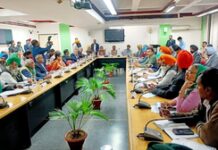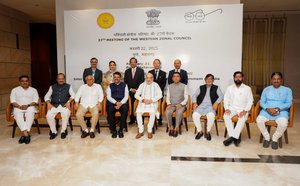Pune, Feb 23 (IANS) Union Home and Cooperation Minister Amit Shah on Saturday expressed concern over the prevalence of malnutrition and stunting among children and citizens in the states from the western zone despite these being among the most prosperous in the country.
Addressing the 27th meeting of the Western Zonal Council comprising Maharashtra, Gujarat, Goa, and the Union Territory of Dadra and Nagar Haveli and Daman and Diu, the Home Minister urged the Chief Ministers, Ministers and Chief Secretaries of the states and the UT to prioritise eliminating malnutrition to improve overall health.
He emphasised that good health is not solely dependent on medicines and hospitals, but efforts should be made to ensure that children and citizens do not require them in the first place. The Home Minister stressed the need for serious attention to the problem of stunting in children and called for all possible measures to resolve it. Additionally, he highlighted the importance of reducing school dropout rates and enhancing the quality of education.
He also expressed concern over the import of pulses and emphasized the need to boost domestic production. He noted that while farmers previously faced difficulties in getting fair prices for pulses, the government has now developed a mobile app that enables the direct purchase of 100 per cent of their produce at the Minimum Support Price (MSP). He urged the western states to actively promote this app and encourage farmer registrations, ensuring fair pricing and contributing to the country’s self-sufficiency in pulse production.
Amit Shah highlighted significant progress in expanding financial access, noting that the goal of establishing bank branches or postal banking facilities within 5 km of every village has almost been accomplished. He emphasised that this achievement, made possible through the cooperation of all states, is a significant milestone and a source of collective satisfaction. “In today’s meeting, a new target was set to further reduce this distance to 3 km, ensuring even greater accessibility,” he said.
Highlighting Prime Minister Narendra Modi’s vision of ‘Sahkar se Samriddhi’, the Home Minister said that cooperation is the key to achieving 100 per cent employment in the country. He stressed the importance of strengthening Primary Agricultural Credit Societies (PACS), making them multi-dimensional, and effectively implementing more than 56 initiatives designed to realize the full potential of ‘Sahkar se Samriddhi’. He urged Maharashtra, Gujarat, and Goa to take all necessary steps to build a robust cooperative infrastructure at the grassroots level.
Referring to the implementation of three new criminal laws, the Home Minister emphasised that it is now time to ensure that citizens receive 100 per cent of the constitutional rights granted to them. He further stated that in the coming days, issues related to digital infrastructure and cybercrime will also be brought under the purview of the Inter-State Council and urged the states to proactively prepare for these developments. He emphasised the importance of leveraging current efforts and a well-defined roadmap to drive the long-term economic development of both the country and states. He stressed the need to maximise growth potential by utilising the strategic platform of regional councils to achieve 100 per cent development objectives.
According to the government release, a total of 18 issues were discussed in the 27th meeting of the Western Zonal Council. These include land transfer, mining, speedy investigation of rape cases against women and children, implementation of Fast Track Special Courts (FTSC) scheme for speedy disposal of rape and Pocso Act cases, implementation of Emergency Response Support System (ERSS-112), bank branches/postal banking facility in every village and issues related to railway project and food security norms.
Apart from these, six issues of national importance were also discussed, which include urban master plans and affordable housing, electricity operation/supply, eliminating malnutrition in children through Poshan Abhiyan, reducing drop-out rate of school children, participation of government hospitals in Ayushman Bharat-Pradhan Mantri Jan Arogya Yojana, strengthening Primary Agricultural Credit Societies (PACS).
Best practices adopted by member states/UTs were also shared in the meeting.
–IANS
sj/vd






























